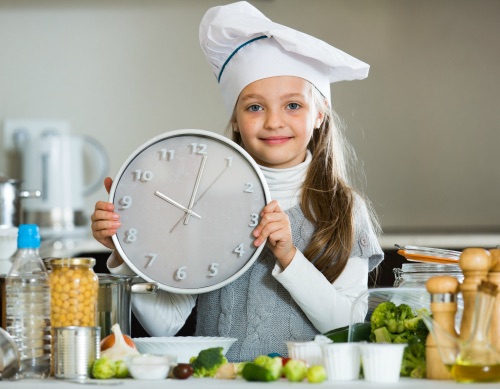
Getting your children in the kitchen can greatly improve their health now, and later on in life as adults.
In a recent study, adults who felt they had adequate cooking skills around the ages of 18-23 were more likely to prepare more meals including vegetables and eat fast food less often (1). It’s never too early to get your kid (whether a toddler or adolescent) cooking in the kitchen with you! Here are just a few more of the many benefits of cooking with your kids:
Cooking with your kids leads to many teachable moments.
While cooking with your children, there are so many opportunities to help them learn and develop concepts. Here are a few topics you can incorporate into cooking time with your kids:
Nutrition and Science:
- When baking, ask your child: Why do we need to add baking soda into a recipe? Why do we add eggs to our baked goods?
Nutrition and Math:
Making a recipe with measuring spoons or cups? Help your kids develop their math skills by getting hands-on practice with measuring. Learning how to set a timer or even multiple timers to stay on task!
Nutrition and Biology:
Teach them about the parts of a plant! Ask your kids: What part of the plant do you think this ingredient originates?
Healthy Eating:
Choose healthy and tasty recipes to teach them good nutrition tastes good!
Reading Nutrition Labels:
For older children, encourage them to look at the nutrition facts and ingredient list, and teach them about how to interpret them. For example, on cereal box look at two types and compare grams of fiber and total sugar. Then see where sugar is in the order of listed ingredients.
Get your kid chefs in the kitchen early.
You can start your kids as young as the age of two with tasks like washing fruits and vegetables, wiping down the table, tearing up greens for salad, and mixing batter. Development of cooking skills at a younger age is correlated with improved attitudes about cooking, increased cooking skills with an increased likelihood of cooking meals at home, and better food choices later in life! (2) So, schedule in a block of time this week. Need guidance? Check out our Super Crew Fun and Tasty Recipe Activities.
Your kids will be inspired to taste new foods and might find some they like.
When kids are involved in the cooking process, they are more likely to try new foods. They may be surprised to discover there are new foods they like! Even if they don’t like something the first few times they try it, it can take up to 8-10 times of trying a new food for your kid to like it. (3)
 Cooking will help your kids develop their confidence and sense of self-efficacy.
Cooking will help your kids develop their confidence and sense of self-efficacy.
Getting involved in the kitchen can help your child develop their confidence and yours in the kitchen! This sense of confidence in their skills and abilities in the kitchen will then make them more likely to continue cooking, and to continue building upon their kitchen skills! (4)
It’s the perfect time to share family food traditions, and create new ones.
While cooking with your kids, dig out those old family favorites that your family ate when you were a child, even if some recipe modification is needed! Your kids will love hearing stories about food from YOUR childhood and hearing the stories that go along with them. It also creates an opportunity for you and your children to discover new favorite recipes and create new memories together.
After preparing a meal together, sit down and enjoy a family dinner.
Family dinners are wonderful times to spend quality time with your family and share the meal you prepared together. Eating together as a family is also linked to improved diet quality, including increased intake of fruits, veggies, and fiber. Family mealtime also allows parents to model healthy eating behaviors to children. TIP: Remember to unplug! Turn off the TV and tuck away cell phones and other electronics.
With all these new reasons to make your children little helpers in the kitchen, it’s time to take action and make mealtime another opportunity to spend quality time as a family!












